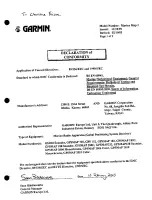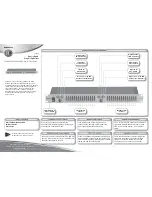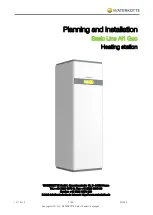
Electrostatically Sensitive Devices (ESD)
Some semiconductor (solid state) devices can be damaged easily by static electricity. Such components
commonly are called Electrostatically Sensitive Devices (ESD). Examples of typical ESD devices are integrated
circuits and some field-effect transistors and semiconductor chip components. The following techniques should
be used to help reduce the incidence of component damage caused by static electricity.
1. Immediately before handling any semiconductor component or semiconductor-equipped assembly, drain off
any electrostatic charge on your body by touching a known earth ground. Alternatively, obtain and wear a
commercially available discharging wrist strap device, which should be removed for potential shock reasons
prior to applying power to the unit under test.
2. After removing an electrical assembly equipped with ESD devices, place the assembly on a conductive surface
such as aluminum foil, to prevent electrostatic charge buildup or exposure of the assembly.
3. Use only a grounded-tip soldering iron to solder or unsolder ESD devices.
4. Use only an anti-static solder removal device. Some solder removal devices not classified as "anti-static" can
generate electrical charges sufficient to damage ESD devices.
5. Do not use freon-propelled chemicals. These can generate electrical charges sufficient to damage ESD
devices.
6. Do not remove a replacement ESD device from its protective package until immediately before you are
ready to install it. (Most replacement ESD devices are packaged with leads electrically shorted together by
conductive foam, aluminum foil or comparable conductive materials).
7. Immediately before removing the protective material from the leads of a replacement ESD device, touch the
protective material to the chassis or circuit assembly into which the device will by installed.
CAUTION : BE SURE NO POWER IS APPLIED TO THE CHASSIS OR CIRCUIT, AND OBSERVE ALL OTHER
SAFETY PRECAUTIONS.
8. Minimize bodily motions when handing unpackaged replacement ESD devices. (Otherwise harmless motion
such as the brushing together of your clothes fabric or the lifting of your foot from a carpeted floor can generate
static electricity sufficient to damage an ESD device).
CAUTION. GRAPHIC SYMBOLS
THE LIGHTNING FLASH WITH APROWHEAD SYMBOL. WITHIN AN EQUILATERAL TRIANGLE, IS
INTENDED TO ALERT THE SERVICE PERSONNEL TO THE PRESENCE OF UNINSULATED
“DANGEROUS VOLTAGE” THAT MAY BE OF SUFFICIENT MAGNITUDE TO CONSTITUTE A RISK OF
ELECTRIC SHOCK.
THE EXCLAMATION POINT WITHIN AN EQUILATERAL TRIANGLE IS INTENDED TO ALERT THE
SERVICE PERSONNEL TO THE PRESENCE OF IMPORTANT SAFETY INFORMATION IN SERVICE
LITERATURE.
1-5
ESD PRECAUTIONS
Summary of Contents for CM9530
Page 11: ...MEMO 1 10 ...
Page 13: ...MEMO 2 2 ...
Page 17: ...A60 A61A 651 652 653 653 4 SPEAKER SECTION 4 1 FRONT SPEAKER NS9530F ...
Page 18: ...A91A 951 952 953 953 A90L 4 2 SUBWOOFER SPEAKER NS9530W LEFT SUBWOOFER ...
Page 19: ...2 10 A91A 951 952 953 953 A90R SUBWOOFER SPEAKER NS9530W RIGHT SUBWOOFER ...
Page 78: ...3 79 3 80 PRINTED CIRCUIT BOARD DIAGRAMS 1 SMPS P C BOARD TOP VIEW ...
Page 80: ...3 83 3 84 2 MAIN P C BOARD TOP VIEW ...
Page 81: ...3 85 3 86 MAIN P C BOARD BOTTOM VIEW ...
Page 82: ...3 87 3 88 3 VOLUME P C BOARD TOP VIEW ...
Page 83: ...3 89 3 90 VOLUME P C BOARD BOTTOM VIEW ...
Page 84: ...3 91 3 92 4 VFD P C BOARD TOP VIEW BOTTOM VIEW ...
Page 85: ...3 93 3 94 5 MIC P C BOARD TOP VIEW BOTTOM VIEW 6 PORTABLE P C BOARD TOP VIEW BOTTOM VIEW ...







































